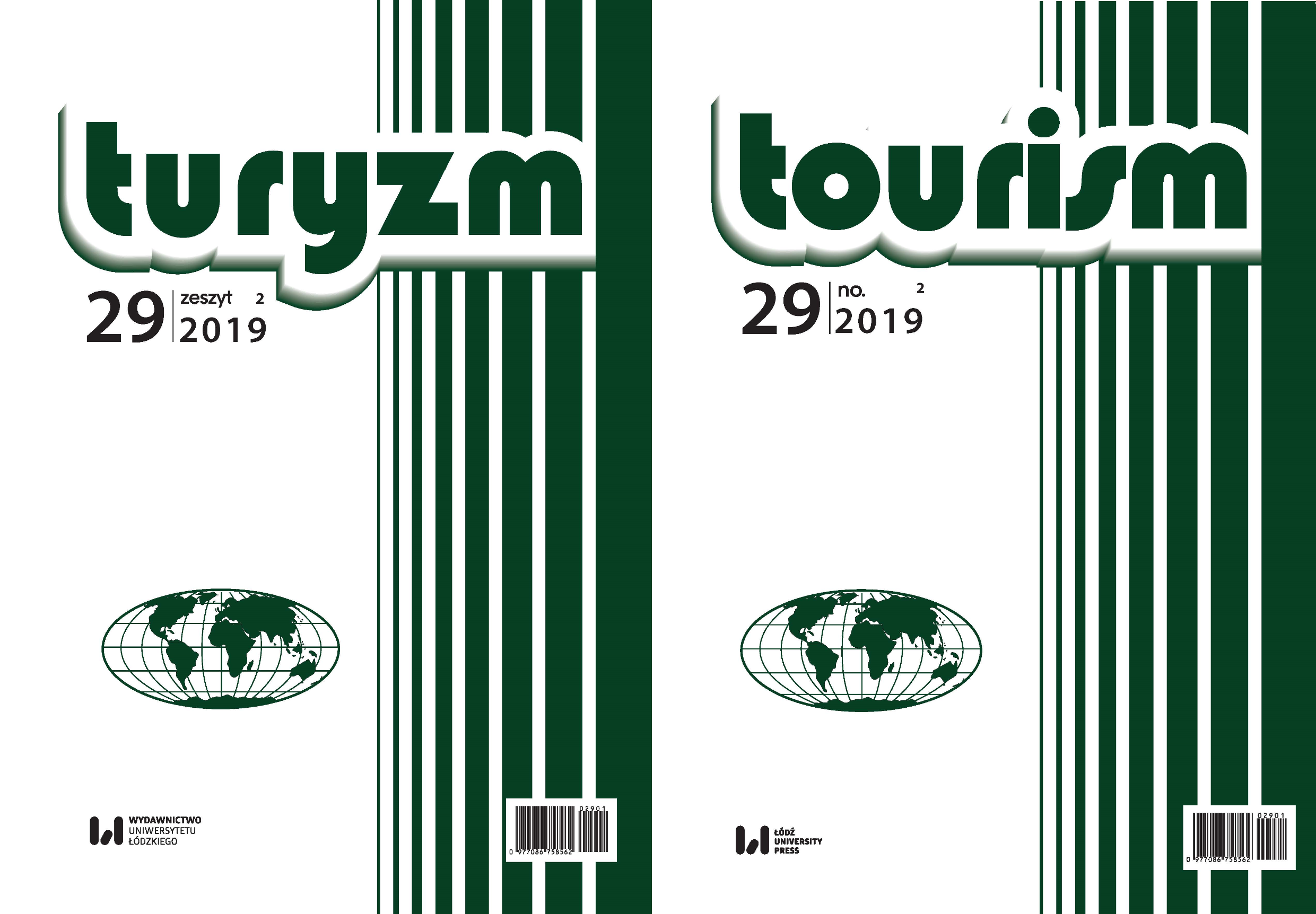Controversial types of travel and the position of Polish tourism service providers: Experience tourism
DOI:
https://doi.org/10.18778/0867-5856.29.2.03Keywords:
travel market controversies, experience tourismAbstract
The aim of this study is to investigate the potential of the Polish market for the development of the supply-side of controversial forms of tourism, based on the opinions and products offered by tour operators and retail travel agents. Analytical data were collected using desk research and CATI (N=107) methods. The most common controversial types of tourism include drug and sex tourism, followed by disaster tourism, medical tourism, slum tourism, fan tourism and poverty tourism. The expectations of customers regarding tourism offers usually focus on party tourism and extreme travel, and the providers highlight that this market segment will continue to develop.
Downloads
References
Abrahams, R.D. (1986). Ordinary and extraordinary experience. In: V.W. Turner, E.M. Bruner (eds), The anthropology of experience (pp. 45-72). Chicago: University of Illinois Press.
Google Scholar
Arnould, E.J., Price, L.L. (1993). River magic: Extraordinary experiences and the extended service encounter. Journal of Consumer Research, 20, 24-45. DOI: https://doi.org/10.1086/209331
Google Scholar
Åstrøm, J.K. (2017). Theme factors that drive the tourist customer experience. International Journal of Culture, Tourism and Hospitality Research, 11, 125-141. DOI: https://doi.org/10.1108/IJCTHR-07-2015-0070
Google Scholar
Baker, M., Page, S., Mayer, D. (2003). Urban visitor perceptions of safety during a special event. Journal of Tourism Research, 41, 355-361. DOI: https://doi.org/10.1177/0047287503041004004
Google Scholar
Bańko, M. (ed.) (2007). Słownik języka polskiego. Vol. 2. Warszawa: Biblioteka Gazety Wyborczej, Wydawnictwo Naukowe PWN.
Google Scholar
Barber, B. (2008). Skonsumowani. Jak rynek psuje dzieci, infantylizuje dorosłych i połyka obywateli. Warszawa: Muza.
Google Scholar
Bauman, Z. (2007). Konsumenci w społeczeństwie konsumentów. Łódź: Wydawnictwo Uniwersytetu Łódzkiego.
Google Scholar
Csíkszentmihályi, M. (1993). The evolving self, a psychology for the third millennium. New York: Harper Collins.
Google Scholar
Deighton, J. (1999). The consumption of performance. Journal of Consumer Research, 19, 362-372. DOI: https://doi.org/10.1086/209307
Google Scholar
Ellis, G.D.V. (1994). Measurement and analysis issues with explanation of variance in daily experience using the flow model. Journal of Leisure Research, 26, 337-356. DOI: https://doi.org/10.1080/00222216.1994.11969966
Google Scholar
Goodwin, C. (1996). Moving the drama into the factory: The contribution of metaphors to services research. European Journal of Marketing, 30, 13-36. DOI: https://doi.org/10.1108/03090569610130025
Google Scholar
Hannabuss, S. (1999). Postmodernism and the heritage experience. Library Management, 20, 295-303. DOI: https://doi.org/10.1108/01435129910276280
Google Scholar
Harris, R., Harris, K., Baron, S. (2003). Theatrical service experiences: Dramatic script development with employees. International Journal of Service Industry Management, 14, 184-199. DOI: https://doi.org/10.1108/09564230310474156
Google Scholar
Jasiński, M. (2006). Aspekty monokulturowe gospodarki turystycznej. Zeszyty Naukowe Kolegium Gospodarki Światowej SGH, 20, 92-102.
Google Scholar
John, J. (1996). A dramaturgical view of the health care service encounter: Cultural value-based impression management guidelines for medical professional behaviour. European Journal of Marketing, 30, 60-74. DOI: https://doi.org/10.1108/03090569610130043
Google Scholar
Kacprzak, A., Dziewanowska, K., Skorek, M. (eds) (2015). Gospodarka doświadczeń. Perspektywa polskiego konsumenta. Warszawa: Wydawnictwo Naukowe PWN.
Google Scholar
Kopaliński, W. (2014). Słownik wyrazów obcych i zwrotów obcojęzycznych z almanachem. Warszawa: Oficyna Wydawnicza “Rytm”.
Google Scholar
Lee, B., Shafer, C.S. (2002). The dynamic nature of leisure experience: An application of affect control theory. Journal of Leisure Research, 34, 290-310. DOI: https://doi.org/10.1080/00222216.2002.11949973
Google Scholar
Lubowiecki-Vikuk, A., Paczyńska-Jędrycka, M. (2010). Współczesne tendencje w rozwoju form rekreacyjnych i turystycznych. Poznań: Bogucki Wydawnictwo Naukowe.
Google Scholar
MacCannell, D. (1973). Staged authenticity: Arrangements of social space in tourist settings. American Journal of Sociology, 79, 589-603. DOI: https://doi.org/10.1086/225585
Google Scholar
MacCannell, D. (1976). The tourist: A new theory of the leisure class. London: MacMillan.
Google Scholar
MacCannell, D. (2002). Turysta, nowa teoria klasy próżniaczej. Warszawa: Muza S.A.
Google Scholar
Moufakkir, O., Burns, P.M. (2012). Controversies in tourism. Wallingford, OX: CAB International.
Google Scholar
Ooi, C.-S. (2002). Cultural tourism and tourism cultures: The business of mediating experiences in Copenhagen and Singapore. Copenhagen: Copenhagen Business School Press.
Google Scholar
Ooi, C.-S. (2003). Crafting tourism experiences: Managing the attention product. Retrieved from: https://www.researchgate.net/publication/265987312_Crafting_Tourism_Experiencs_Manag-ing_the_Attention_Product (11.09.2018).
Google Scholar
Otto, J.E., Ritchie, R.J.B. (1996). The service experience in tourism. Tourism Management, 17, 165-174. DOI: https://doi.org/10.1016/0261-5177(96)00003-9
Google Scholar
Panasiuk, A. (2015). Miejsce turystyki kontrowersyjnej w strukturze rynku turystycznego. In: G. Godlewski, M. Zalech (eds), Turystyka kontrowersyjna na współczesnym rynku podróży – formy, uwarunkowania, skutki (pp. 7-21). Biała Podlaska: Wydawnictwo AWF.
Google Scholar
Pine, B.J., Gilmore, J.H. (1998). Welcome to the experience economy. Retrieved from: https://hbr.org/1998/07/welcome-to-the-experience-economy (10.09.2018).
Google Scholar
Podemski, K. (2013). Wyreżyserowana przestrzeń turystyczna. Retrieved from: http://post-turysta.pl/artykul/Wyrezyserowana-przestrzen-turystyczna (5.09.2018).
Google Scholar
Poulsson, S.H.G., Kale, S.H. (2004). The experience economy and commercial experiences. The Marketing Review, 4, 267-277. DOI: https://doi.org/10.1362/1469347042223445
Google Scholar
Prentice, R.C., Witt, S.F., Hamer, C. (1998). Tourism as experience: The case of heritage parks. Annals of Tourism Research, 25, 1-24. DOI: https://doi.org/10.1016/S0160-7383(98)00084-X
Google Scholar
Rageh, A., Melewar, T.C., Woodside, A. (2013). Using netnography research method to revel the underlying dimensions of the customer/tourist experience. Qualitative Market Research: An International Journal, 16, 126-149. DOI: https://doi.org/10.1108/13522751311317558
Google Scholar
Rittichainuwat, B.N., Chakraborty, G. (2009). Perceived travel risks regarding terrorism and disease: The case of Thailand. Tourism Management, 30, 410-418. DOI: https://doi.org/10.1016/j.tourman.2008.08.001
Google Scholar
Sigala, M. (2016). Social Media and the co-creation of tourism experiences. In: M. Sotiriadis, D. Gursoy (eds), The handbook of managing and marketing tourism experiences (pp. 85-111). Bradford: Emerald Group Publishing Limited. DOI: https://doi.org/10.1108/978-1-78635-290-320161033
Google Scholar
Słownik języka polskiego (2018). Retrieved from: http://sjp.pwn.pl (12.09.2018).
Google Scholar
Stamboulis, Y., Skayannis, P. (2003). Innovation strategies and technology for experience – based tourism. Tourism Manage-ment, 24, 35-43. DOI: https://doi.org/10.1016/S0261-5177(02)00047-X
Google Scholar
Stasiak, A. (2011). Współczesna przestrzeń turystyczna. In: M. Durydiwka, K. Duda-Gromada (eds), Przestrzeń turystyczna. Czynniki, różnorodność, zmiany (pp. 39-51). Warszawa: Wyd. Wydziału Geografii i Studiów Regionalnych, Uniwersytet Warszawski.
Google Scholar
Stasiak, A. (2013). New spaces and forms of tourism in expe-rience economy. Turyzm/Tourism, 23 (2), 59-67.
Google Scholar
Stasiak, A. (2015). Turystyka kontrowersyjna jako emanacja gospodarki doświadczeń. In: G. Godlewski, M. Zalech (eds), Turystyka kontrowersyjna na współczesnym rynku podróży – formy, uwarunkowania, skutki (pp. 53-69). Biała Podlaska: Wydawnictwo AWF.
Google Scholar
Urry, J. (1990). The tourist gaze: Leisure and travel in contemporary societies. London: Sage Publications.
Google Scholar
Waitt, G. (2000). Consuming heritage: Perceived historical authenticity. Annals of Tourism Research, 27, 835-862. DOI: https://doi.org/10.1016/S0160-7383(99)00115-2
Google Scholar
Walker, G. J., Hull, R.B., Roggenbuck, J.W. (1998). On-site optimal experiences and their relationship to off-site benefits. Journal of Leisure Research, 30, 453-471. DOI: https://doi.org/10.1080/00222216.1998.11949843
Google Scholar
Waller, J., Lea, S.E.G. (1999). Seeking the real Spain? Authenticity in motivation. Annals of Tourism Research, 26, 110-129. DOI: https://doi.org/10.1016/S0160-7383(98)00058-9
Google Scholar
Weisheng, Ch., Ho, K.L. (2017). Let’s go cycling: an analysis of tourists’ experience on online user-generated content. International Journal of Tourism Cities, 3, 30-42. DOI: https://doi.org/10.1108/IJTC-10-2016-0045
Google Scholar
Williams, J.A., Anderson, H.H. (2005). Engaging customers in service creation: A theatre perspective. Journal of Services Marketing, 19, 13-23. DOI: https://doi.org/10.1108/08876040510579352
Google Scholar
Zatori A., Beardsley, M. (2017). On-site and memorable tourist experiences: trending toward value and quality-of-life out-comes. Advances in Hospitality and Leisure, 13, 17-45. DOI: https://doi.org/10.1108/S1745-354220170000013003
Google Scholar
Downloads
Published
How to Cite
Issue
Section
License

This work is licensed under a Creative Commons Attribution-NonCommercial-NoDerivatives 4.0 International License.










